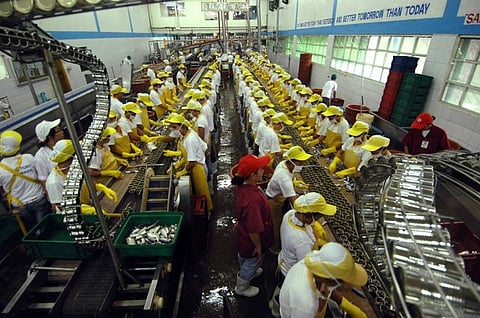
- NEWS
- the EDIT
- COMMENTARY
- BUSINESS
- LIFE
- SHOW
- ACTION
- GLOBAL GOALS
- SNAPS
- DYARYO TIRADA
- MORE

As the House of Representatives approved House Bill No. 11376, or the “Wage Hike For Minimum Wage Workers Act,” on second reading on Monday, which seeks a P200 increase in the daily wage of workers in the private sector, several business organizations have united in stating that they are up in arms over the measure, maintaining that the sweeping nature of the proposal will have upsetting effects on business owners, particularly small and micro enterprises, and the entire Philippine economy.
In their position paper sent to House Committee on Labor Employment chairperson Juan Fidel Felipe Nograles, business groups namely the Employers Confederation of the Philippines, the Philippine Chamber of Commerce and Industry, the Philippine Exporters Confederation Inc., the Philippine Hotel Owners Association, the Philippine Association of Legitimate Service Contractors, the Philippine Retailers Association, the Federation of Filipino-Chinese Chambers of Commerce and Industry, the Philippine Constructors Association Inc., the People Management Association of the Philippines, and the Semiconductor and Electronics Industries in the Philippines Inc., laid down the negative implications of the measure.
The group relayed that, on the impact on micro and small businesses, they said mandating a blanket wage increase of P200 a day will disproportionately burden small and medium enterprises, many of which are operating with slim margins and lack the financial flexibility to absorb such a significant increase in labor costs.
Also, the said business groups mentioned that, in terms of the exclusion of informal sector workers, they reiterated that approximately 70 percent of the Philippine workforce is engaged in the informal economy, where workers often lack formal contracts, benefits, and protections.
The measure, with some parties asking for President Ferdinand Marcos Jr. to make the proposal urgent, covers private sector workers in contractual and sub-contractual arrangements, whether they are working in the agriculture or non-agriculture sector.
“These workers, who are crucial to our economy, will be left behind by this wage hike. They are not covered by the law in its current form, further deepening the divide between the formal and informal sectors. The proposed wage increase does little to address the needs of this large and vulnerable segment of the workforce and may inadvertently drive informal workers further into the margins of the economy,” the groups said.
Wage distortion
Also, the groups stressed that House Bill No. 11376 could distort present wages, which occurs when there is a sharp discrepancy between the wages of workers with similar skill sets and responsibilities that can cause disruption in pay structures and lead to unfair wage disparities.
“For example, workers in certain regions or industries with lower existing wages may see a sudden and disproportionate increase in their daily pay, while employees in sectors or regions where wages are already higher may not experience the same level of adjustment. This could create an imbalance, leading to dissatisfaction among employees, complications in wage negotiations, and long-term problems for employers who will be forced to re-align their compensation structures across the board,” the business organizations explained.
“The unintended consequence could be that employers face a fragmented workforce where salary levels no longer reflect productivity, experience, or job complexity,” they added.
Also, the groups said that mandatory wage hikes would place a heavy financial strain on employers, particularly in industries where labor costs represent a significant portion of their expenses. In many cases, businesses will be forced to pass some increased costs on to consumers in the form of higher prices for goods and services, further exacerbating inflationary pressures in the economy, leading to higher living costs for all Filipinos, including the very workers this bill aims to protect.
Businesses to shut down
Furthermore, the groups said the unintended consequence of the proposal is the potential for widespread business closures, especially among MSMEs that are already operating on thin margins.
“With the additional cost of a P200 daily wage increase, many small businesses will be unable to sustain operations, leading to layoffs and potentially permanent closures. The result will be a net loss of jobs and a further destabilization of the labor market,” according to the groups.
They said many industries, including manufacturing, retail, and services, operate in highly competitive markets where cost control is essential to profitability, noting that an increase of P200 per day for all workers will strain their financial capacity and could result in delayed investments, reduced hiring, and potentially even job cuts as companies are forced to streamline operations.
Lastly, the groups said the proposed bill’s stringent provisions, including penalties of up to P100,000 and/or imprisonment, along with double indemnity for unpaid benefits, place a heavy compliance burden on employers, particularly those in micro and small enterprises who may lack the resources to ensure full compliance.
“The risk of criminal liability and hefty fines, especially during times of economic hardship, could further discourage business growth and the creation of new jobs. The heavy penalties may inadvertently create an adversarial relationship between employers and employees, rather than fostering collaboration and mutual benefit,” the position paper disclosed.
Business leaders who signed the position paper were Edgardo Lacson, chairperson of ECOP; PCCI president Enunina Mangio; and Sergio Ortiz-Luis Jr., president of PHILEXPORT, among other business organization presidents.
